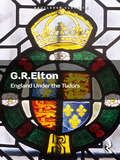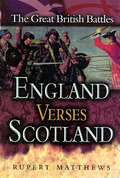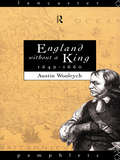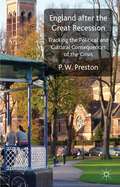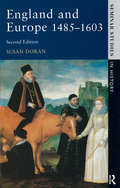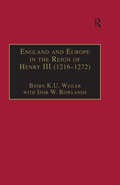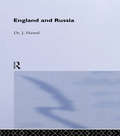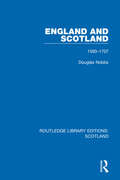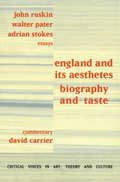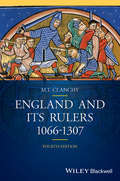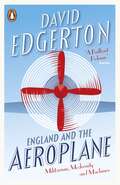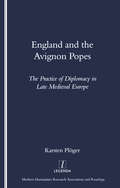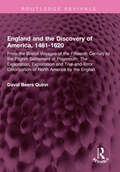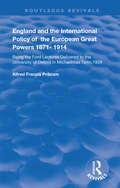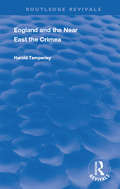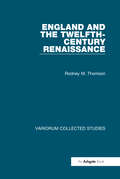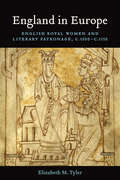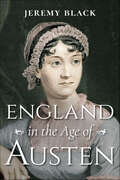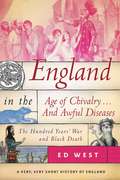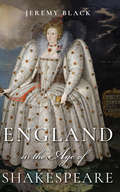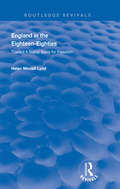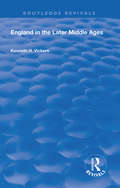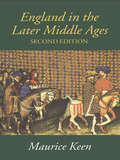- Table View
- List View
England Under the Tudors (Routledge Classics)
by G. R. Elton‘Anyone who writes about the Tudor century puts his head into a number of untamed lions’ mouths.’ G.R. Elton, Preface Geoffrey Elton (1921–1994) was one of the great historians of the Tudor period. England Under the Tudors is his major work and an outstanding history of a crucial and turbulent period in British and European history. Revised several times since its first publication in 1955, England Under the Tudors charts a historical period that witnessed monumental changes in religion, monarchy, and government – and one that continued to shape British history long after. Spanning the commencement of Henry VII's reign to the death of Elizabeth I, Elton’s magisterial account is populated by many colourful and influential characters, from Cardinal Wolsey, Thomas Cranmer, and Thomas Cromwell to Henry VIII and Mary Queen of Scots. Elton also examines aspects of the Tudor period that had been previously overlooked, such as empire and commonwealth, agriculture and industry, seapower, and the role of the arts and literature. This Routledge Classics edition includes a new foreword by Diarmaid MacCulloch.
England Versus Scotland (The Great British Battles)
by Rupert MatthewsDelve into a thousand years of battle and rebellion with this vivid chronicle of warfare between Scotland and England—with battlefield information.Today, England and Scotland limit their fierce rivalry to the football field, but as historian Rupert Matthews demonstrates in this engaging volume, this was not always the case. Before the eighteenth century Act of Settlement in the Eighteenth Century, these neighboring lands were locked in a long, contentious, and often bloody conflict. Matthews has researched more than twenty major battles between England and Scotland. They range from the seventh century Battle of Degsastan to the Jaobite Rising’s bitter end at Culloden in the eighteenth century. Each battle forms a chapter, explaining the causes of the conflict, the forces involved, the battle itself, and a brief guide to the battlefield as it is today.
England Without a King 1649-60 (Lancaster Pamphlets)
by Austin WoolrychProfessor Woolrych surveys the establishment and history if the Commonwealth and Protectorate, first explaining how the country lost its king, and how Oliver Cromwell became Lord Protector. Professor Woolrych challenges accepted views on the nature of the Protectorate, and finally offers some guidelines to the tangled period between Cromwell's death and the Restoration.
England after the Great Recession
by P. W. PrestonAn exploration of the recent financial crisis which argues that the hitherto dominant intellectual and policy paradigm of neo-liberalism has been fatally weakened and will in due course be replaced. The implications of the crisis for politico-cultural identities and our sense of ourselves as members of an ordered society are explored.
England and Europe 1485-1603 (Seminar Studies)
by Susan DoranThis Seminar Study introduces students to England's foreign policy during the reigns of the Tudor monarchs. In this succinct introduction the author addresses the key questions facing students - for example, to what extent did monarch or minister make policy. Each reign is analysed in turn providing a narrative and explanation of the major events and policy decisions throughout the Tudor period.
England and Europe in the Reign of Henry III (1216–1272)
by Ifor W. RowlandsThe close political, economic and cultural ties that developed between England and its neighbours were a defining feature of the rule of Henry III, which permeated nearly all levels of society from the king and his barons to the Church and merchants, artisans and fortune hunters. They were evident both in the high politics of Henry III, as well as in the more general cultural developments, as can be seen in the French architecture, Italian masonry and German goldwork of Westminster Abbey. They can likewise be traced with regard to individuals such as Simon de Montfort, whose family was active in the Holy Land, Languedoc, Northern France and England. In short, thirteenth century England formed part of a broader European cultural, political and economic commonwealth. The essays that form this volume demonstrate the variety and strength of these contacts between England and her neighbours during Henry's reign, and by seeking to place Henry's England within a broader geographical and thematic range, will contribute to a broader understanding of England's place within thirteenth century Europe.
England and Its Rulers: Foreign Lordship and National Identity
by M. T. ClanchyFrom William the Conqueror to 1270.
England and Russia: Comprising the Voyages of John Tradescant the Elder, Sir Hugh Willoughby, Richard Chancellor, Nelson and Others, to the White
by J. HamelFirst Published in 1968. Routledge is an imprint of Taylor & Francis, an informa company.
England and Scotland: 1560-1707 (Routledge Library Editions: Scotland #22)
by Douglas NobbsOriginally published in 1952, this book analyses the constitutional, religious, economic and social conditions of the two countries in the late sixteenth century and surveys the complicated history of the following century. The Reformation made possible a transformation of Anglo-Scottish relations. Owing to the difference of institutions, traditions, and ideals, the alternative to absolutism was in the earlier instance the Cromwellian Protectorate and in the later the movement toward national separation arrested only by the contract of the Act of Union. This book charts the history of these relations in the light of divergent national traditions and ideals.
England and its Aesthetes: Biography and Taste (Critical Voices in Art, Theory and Culture)
by David CarrierFirst Published in 1999. Routledge is an imprint of Taylor & Francis, an informa company.
England and its Rulers: 1066 - 1307 (Blackwell Classic Histories of England)
by Michael T. ClanchyThis is an updated and expanded edition of a classic introduction to medieval England from the reign of William the Conqueror to Edward I. Includes a new chapter on family and gender roles, revisions throughout to enhance the narrative flow, and further reading sections containing the most up-to-date sources Offers engaging and clear discussion of the key political, economic, social, and cultural issues of the period, by an esteemed scholar and writer Illustrates themes with lively, pertinent examples and important primary sources Assesses the reigns of key Norman, Angevin, and Plantagenet monarchs, as well as the British dimension of English history, the creation of wealth, the rise of the aristocracy, and more
England and the Aeroplane: Militarism, Modernity and Machines
by David EdgertonThe story of the strange mixture of romanticism, militarism and technology that has made planes so important to England, from the brilliant author of Britain's War MachineThe history of England and the aeroplane is one tangled with myths - of 'the Few' and the Blitz, of boffins, flying machines, amateur inventors and muddling through. In England and the Aeroplane David Edgerton reverses received wisdom, showing that the aeroplane is a central and revealing aspect of an unfamiliar English nation: a warfare state dedicated to technology, industry, empire and military power.England had the strongest air force in the Great War, the largest industry in the world in the 1920s, outproduced Germany by 50% at the time of the Battle of Britain and was the third largest producers of aeroplanes well after this time. In a revelatory recounting of the story of aeronautical England, from its politics to its industry and culture, David Edgerton reconfigures some of the most important chapters of our history.Reviews:'A brilliant polemic' Guardian'Full of good stories ... an illuminating read' Spectator'A tour de force, after which the history of the aircraft industry will never be quite the same again' Business History'David Edgerton's sure-footed essay ... sees Britain from an unusual perspective ... His arguments provide sound backing for the idea that modern Britain is as much a warfare state as a welfare one' EconomistAbout the author:David Edgerton is Hans Rausing Professor at Imperial College London, where he was the founding director of the Centre for the History of Science, Technology and Medicine. He is the author of a sequence of groundbreaking books on 20th century Britain: Science, Technology and the British Industrial 'Decline', 1870-1970; Warfare State: Britain, 1920-1970; and Britain's War Machine, published by Penguin. He is also the author of the iconoclastic and brilliant The Shock of the Old: Technology and Global History Since 1900.
England and the Avignon Popes: The Practice of Diplomacy in Late Medieval Europe
by Karsten Pluger"Much has been written about the complex relationship between England and the papacy in the 14th century, yet the form (rather than the content) of the diplomatic intercourse between these two protagonists has not hitherto been examined in detail. Drawing on a wide range of unpublished sources, Pluger explores the techniques of communication employed by the Crown in its dealings with Clement VI (1342-52) and Innocent VI (1352-62). Methodologies of social and cultural history and of International Relations are brought to bear on the analysis of the dialogue between Westminster and Avignon, resulting in a more complete picture of 14th-century Anglo-papal relations in particular and of medieval diplomatic practice in general."
England and the Discovery of America, 1481-1620: From the Bristol Voyages of the Fifteenth Century to the Pilgrim Settlement at Playmouth: The Exploration, Exploitation and Trial-and-Error Colonization of North America by the English (Routledge Revivals)
by David B. QuinnFirst published in 1974, England and the Discovery of America places the early explorations of the English in North America in the broad context of 15th and 16th century history. Marshalling evidence that cannot be pushed aside and sifting a mass of fascinating detail (including problems of cartography and the Vinland Map controversy), Professor Quinn presents circumstantial indications pointing to 1481 as the date or the discovery of America by Bristol voyagers – fishermen seeking new sources of cod, and merchant sailors with maps carrying promise of unexploited Atlantic islands. Whereas England did little to follow up her early lead, Quinn demonstrates that English initiatives from the 1580s onward, though slow, were of great importance. He brings to life the men involved in a variety of rash and heroic experiments in colonization and casts new light on their fates. He makes it clear that it was this very profusion of trial and error and trail again, as well as the conviction that settlement in temperate latitudes in North America could be effective if tenaciously enough sought, that enabled the English to strike and maintain routes in their new American world. This book will be of interest to students of English history, American history, colonial history and naval history.
England and the International Policy of the European Great Powers 1871 – 1914 (Routledge Revivals)
by Alfread Francis PribramFirst published in 1931, this volume publishes the Ford Lectures given at Oxford University in late 1929 by Alfred Francis Pribram in their original form. The primary motive has been that English scholars should realize how British foreign policy during the years 1871-1914 appears to a Continental historian. Pribram seeks to indicate the policy pursued by leading British statesmen in decisive international questions of their time and to reveal the principles which induced them to act as they did. He further outlines the policies of the leading statesmen of other European Great Powers and reproduce their opinion of British foreign policy.
England and the Near East: The Crimea (Routledge Revivals)
by Harold TemperleyOriginally published in 1964, this volume focuses on the history of England's relations with the Near East from the death of Canning until the day when Disraeli brought back 'peace with honour' from Berlin. The period begins with the British fleet's destruction of Turkish sea-power at Naarino and ends with its protection of the Turkish capital against Russia. The aim is not a study of diplomatic or naval history, but a general narrative in which these speical features are found side by side with a study of Oriental institutions and of Balkan nationalities.
England and the Twelfth-Century Renaissance (Variorum Collected Studies)
by Rodney M. ThomsonBooks and learning in 12th-century Europe are the broad concern of the nineteen papers assembled here. The discussion of ’books’ ranges from important individual manuscripts, to collections manufactured in ’scriptoria’ and kept in ’libraries’; the ’learning’ is primarily the composition, transmission and study of Latin literary texts, both ancient and contemporary. Special attention is given to the Latin classics, to the literary culture of the larger Benedictine houses, to the phenomenal quantity of Latin satirical writing of the period, and to the dissemination and reception of texts and ideas over time. While the geographical focus is England, the relationship of English materials and developments to the wider European context is constantly emphasized.
England in Europe: English Royal Women and Literary Patronage, c.1000–c.1150
by Elizabeth Muir TylerIn England in Europe, Elizabeth Tyler focuses on two histories: the Encomium Emmae Reginae, written for Emma the wife of the Æthelred II and Cnut, and The Life of King Edward, written for Edith the wife of Edward the Confessor. Tyler offers a bold literary and historical analysis of both texts and reveals how the two queens actively engaged in the patronage of history-writing and poetry to exercise their royal authority. Tyler’s innovative combination of attention to intertextuality and regard for social networks emphasizes the role of women at the centre of Anglo-Saxon and Anglo-Norman court literature. In doing so, she argues that both Emma and Edith’s negotiation of conquests and factionalism created powerful models of queenly patronage that were subsequently adopted by individuals such as Queen Margaret of Scotland, Countess Adela of Blois, Queen Edith/Matilda, and Queen Adeliza. England in Europe sheds new lighton the connections between English, French, and Flemish history-writing and poetry and illustrates the key role Anglo-Saxon literary culture played in European literature long after 1066.
England in the Age of Austen
by Jeremy Black“This brisk, decorous, and incisive history . . . would have delighted its namesake as much as it will delight and instruct contemporary readers.” —Roger Kimball, Editor and publisher, The New CriterionDedicated fans of Jane Austen’s novels will delight in accompanying historian Jeremy Black through the drawing rooms, chapels, and battlefields of the time in which Austen lived and wrote. In this exceedingly readable and sweeping scan of late eighteenth- and early nineteenth-century Britain, Black provides a historical context for a deeper appreciation of classic novels such as Pride and Prejudice, Emma, and Sense and Sensibility. While Austen’s novels bring to life complex characters living in intimate surroundings, England in the Age of Austen provides a fuller account of what the village, the church, and the family home would really have been like. In addition to seeing how Austen’s own reading helped her craft complex characters like Emma, Black also explores how recurring figures in the novels, such as George III or Fanny Burney, provide a focus for a historical discussion of the fiction in which they appear. Jane Austen’s world was the source of her works and the basis of her readership, and understanding that world gives fans new insights into her enduring literature.“Superb. . . . Essential reading for the Austen enthusiast.” —William Gibson, Oxford Brookes University“England in the Age of Austen recovers a world before the Victorians that brings one of our greatest authors into clearer focus.” —William Anthony Hay, Mississippi State University“An absolute ‘must’ for the legions of Jan Austen fans . . . an extraordinarily well written history, impressively detailed, and a seminal work of original scholarship.” —Midwest Book Review
England in the Age of Chivalry . . . And Awful Diseases: The Hundred Years' War and Black Death
by Ed WestA revealing glimpse into the tumultuous history of England’s medieval period, full of knights in shining armor and terrible peasant suffering. Covering the violent and disease-ridden period between 1272 to 1399, England in the Age of Chivalry. . . And Awful Diseases covers the events, personages and ideas most commonly known as "medieval". This includes Geoffrey Chaucer, the Peasants revolt, the Scottish wars of independence, the Great Famine of 1315, the Black Death and the 100 Years War. Central to this time is King Edward III, who started the 100 Years War and defined the concept of chivalry, including England's order of the garter. His legacy continues to shape our view of England’s history and is crucial in understanding the development of Europe.
England in the Age of Shakespeare
by Jeremy BlackHow did it feel to hear Macbeth’s witches chant of "double, double toil and trouble" at a time when magic and witchcraft were as real as anything science had to offer? How were justice and forgiveness understood by the audience who first watched King Lear; how were love and romance viewed by those who first saw Romeo and Juliet? In England in the Age of Shakespeare, Jeremy Black takes readers on a tour of life in the streets, homes, farms, churches, and palaces of the Bard’s era. Panning from play to audience and back again, Black shows how Shakespeare’s plays would have been experienced and interpreted by those who paid to see them. From the dangers of travel to the indignities of everyday life in teeming London, Black explores the jokes, political and economic references, and small asides that Shakespeare’s audiences would have recognized. These moments of recognition often reflected the audience’s own experiences of what it was to, as Hamlet says, "grunt and sweat under a weary life." Black’s clear and sweeping approach seeks to reclaim Shakespeare from the ivory tower and make the plays’ histories more accessible to the public for whom the plays were always intended.
England in the Age of Wycliffe
by George Macaulay TrevelyanA critical look at the history of "England in the Age of Wycliffe", in the spheres of government, politics and religion.
England in the Eighteen Eighties: Toward A Social Basis For Freedom (Routledge Revivals)
by H. M LyndFirst published in 1945, this volume compares the theoretical panic and practical confusion of its present time to that of the eighteen-eighties and looks to it for direction and inspiration. Following the decade, the Reynolds’ Newspaper commented that "Eighteen seventy-nine is gone, and we all have reason to be thankful that it is now only a record". The decade faced challenges in agriculture, a bitter parliament, war on two continents, stagnant commerce and changing social norms. 1879 in particular was a year combining more circumstances of misfortune and depression than any within general experience at the time. Then, as in 1945, there was a new sense of being in the dark, surrounded by the unknown. H.M. Lynd hoped to gain some insight into possible directions of change from a study of this critical period.
England in the Later Middle Ages (Routledge Revivals)
by K.H. VickersFirst published in 1950 in its 7th edition, this volume became a standard work. Covering 213 years, it begins with Edward I and proceeds through events including the Black Death and the Hundred Years War to Edward IV. In doing so, the author balanced political, constitutional, social and economic aspects of England’s national evolution.
England in the Later Middle Ages: A Political History
by M.H. KeenFirst published to wide critical acclaim in 1973, England in the Later Middle Ages has become a seminal text for students studying this diverse, complex period. This spirited work surveys the period from Edward I to the death of Richard III at the Battle of Bosworth, which heralded in the Tudor Age.The second edition of this book, while maintaining the character of the original, brings the study up to date. Each chapter includes a discussion of the historiographical developments of the last decade and the author takes a fresh look at the changing world of the Later Middle Ages, particularly the plague and the economy. Also included is a rewritten introduction.
